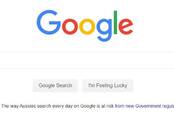This article is more than 1 year old
Australia mostly sticks to its guns in final plan to make Google and Facebook pay news publishers
YouTube and Instagram exempted, Bill kicked into committee for a while
Australia has revealed the legislation with which it plans to force Google and Facebook to pay local news publishers for linking to their content, a plan the nation hatched to funnel more revenue to news outlets whose business models didn't evolve fast enough to remain viable in the internet age.
The legislation reveals one big win for the web giants as YouTube and Instagram have been exempted from the proposed scheme, although it is possible they and other digital services could be added to the scheme in future. For now, just Facebook's News Feed and Google Search are covered.
But the Treasury Laws Amendment (News Media and Digital Platforms Mandatory Bargaining Code) Bill 2020 [PDF] doesn't otherwise diverge markedly from the News Media Bargaining Code.
The scheme itself remains in place and has even expanded to include Australia's two public broadcasters.
One of Google's big objections to the plan, requiring Facebook and Google to negotiate payments with local publishers in a process that will end in binding arbitration if no agreement is reached, remains in place.
But as the explanatory memorandum [PDF] for the Bill explains, those negotiations must now consider the value of traffic that Google and Facebook generate for publishers. That value was not considered in previous drafts and the change should mean the web giants cough up less cash. The web giants will also be allowed to develop cookie-cutter offers for publishers, rather than having to negotiate anew each time a news organisation becomes part of the scheme.
The giants will also appreciate a change to the requirement of advance notice of algorithm changes. The code will now require 14 days' notice (down from 28) and only for changes that directly impact news organisations, and only of deliberate changes. This change means that the web giants' on-the-fly algorithm tweaks, which can happen multiple times a day, will not need to be reported
The final code also explicitly states that while the web giants may have to share some data with publishers, the personal data protection provisions of Australia's Privacy Act will apply. Google's argument that the code could harm Australians therefore sinks. The Register has asked Google to comment on the new legislation. The company told us it was able to access the Bill at the same time as anyone else, so was yet to develop a position. Which suggests it what was not able to exercise enormous influence over its drafting.
Australia's Treasurer, Josh Frydenberg, who has carriage of the legislation, went out of his way to say the law is being watched around the world.
But the world will get to watch Australia's Senate consider the Bill in a committee, rather than seeing it passed into law.
It is unclear when the Bill will be passed or come into effect. So Facebook and Google, which have both raised the prospect of reducing the scope of their Australian services, have plenty of time to fight back. ®
Bootnote
The Register is not eligible to receive payment under Australia's plan and reports this story as it is potentially a global precedent for how publishers and web giants interact.

